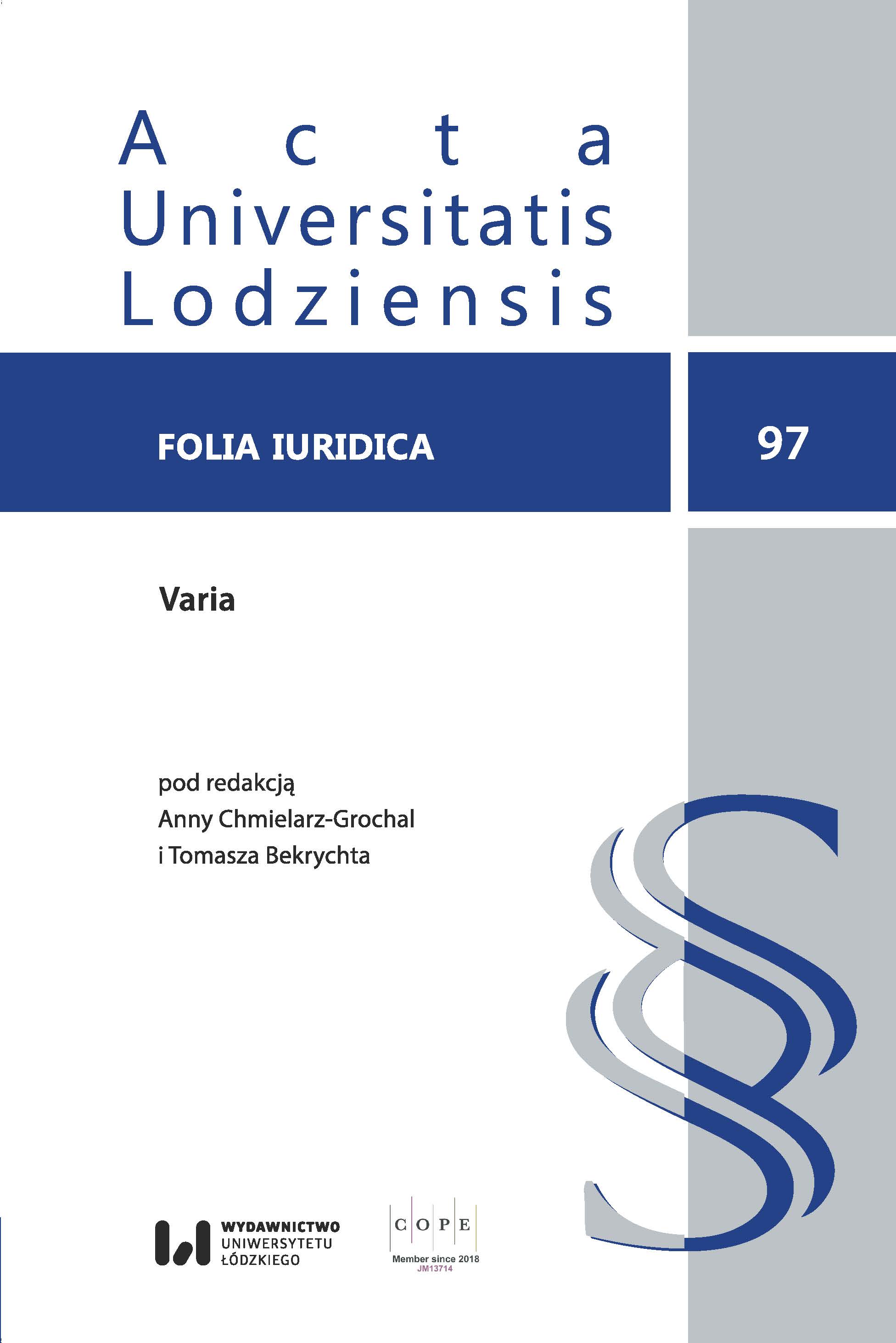Censorship and whistleblowing in a workplace: selected issues
DOI:
https://doi.org/10.18778/0208-6069.97.07Keywords:
employee loyalty, COVID-19 pandemic, whistleblower, whistleblowing, Polish labor law, employees, dismissal, censorshipAbstract
The article will present four cases of abuses against Polish whistleblowers, including the last one from the period of the COVID-19 pandemic. Therefore, this article aims to draw attention to the problem of abuses against whistleblowers in Poland in the context of the employee’s obligation to care for the welfare of the workplace and the integrally related loyalty to the employer. The author used the upcoming implementation of the Directive of the European Parliament and the Council (EU) 2019/1937 of 23 October 2019 on the protection of persons reporting breaches of EU law as a background for her considerations. The author claims that the legislator in Poland will confront the challenge of redefining the issue of loyalty in labor law and the related freedom of expression of employees.
Downloads
References
Banisar, David. 2011. ”Whistleblowing: International Standards and Developments”. In Corruption and Transparency: Debating the Frontiers between State, Market and Society. Edited by Irma E. Sandoval. Washington: World Bank-Institute for Social Research. https://www.researchgate.netpublication228124587_Whistleblowing_International_Standards_and_Development
Google Scholar
Boć, Jan. Ed. 2004. Prawo administracyjne. Wrocław: Kolonia Limited.
Google Scholar
Boot, Eric. 2020. “The Feasibility of a Public Interest Defense for Whistleblowing”. Law and Philosophy 30: 1–34. https://doi.org/10.1007/s10982-019-09359-1
Google Scholar
DOI: https://doi.org/10.1007/s10982-019-09359-1
Borek-Buchajczyk, Renata. 2018. “Brak lojalności pracownika jako przyczyna rozwiązania umowy o pracę w orzecznictwie sądowym. Wybrane uwagi”. Annales Universitatis Mariae Curie-Skłodowska Lublin – Polonia 65(2): 47–57. https://doi.org/10.17951/g.2018.65.2.47-57
Google Scholar
DOI: https://doi.org/10.17951/g.2018.65.2.47-57
Bouville, Mathieu. 2008. “Whistle-blowing and Morality”. Journal of Business Ethics 81(3): 579– 585. https://doi.org/10.1007/s10551-007-9529-7
Google Scholar
DOI: https://doi.org/10.1007/s10551-007-9529-7
Chobot, Andrzej. 1983. Pracowniczy obowiązek dbałości o dobro zakładu pracy a ograniczenie zasady wolności pracy. Poznań: Wydawnictwo Naukowe UAM.
Google Scholar
Gerrig, Richard. Zimbardo Phillip. 2021. Psychologia i życie. Warszawa: Wydawnictwo Naukowe PWN.
Google Scholar
Huseynova, Dilara. Katerina Piperigos. 2018. Justice for justice: Protecting whistleblowers in the EU. Protection of whistleblowers – the why and the how. College of Europe Transparency Group. http://transparency.eu/wp-content/uploads/2018/04/WB_Transparency-Group-CoE-17-18.pdf
Google Scholar
Jubb, Paul. 1999. “Whistleblowing: A Restrictive Definition and Interpretation”. Journal of Business Ethics 21: 77–94. https://doi.org/10.1023/A:1005922701763
Google Scholar
DOI: https://doi.org/10.1023/A:1005922701763
Kobroń, Łucja. 2013. “Whistleblower – strażnik wartości czy donosiciel?” Palestra 12–13: 297–301.
Google Scholar
Kobroń-Gąsiorowska, Łucja. 2015. “Czy Polskę czeka era ‘etycznych donosów’?” Zeszyty Naukowe Towarzystwa Doktorantów UJ. Nauki Społeczne 10: 81–92.
Google Scholar
Kobroń-Gąsiorowska, Łucja. 2019. „Interes Publiczny jako element podstawowy funkcji ochronnej prawa pracy w kontekście ochrony sygnalistów”. Roczniki Administracji i Prawa 2: 333–343. https://doi.org/10.5604/01.3001.0013.3605
Google Scholar
DOI: https://doi.org/10.5604/01.3001.0013.3605
Kuczyński, Tadeusz. 2004. “O właściwościach pracowniczego obowiązku dbałości o dobro zakładu pracy”. Praca i Zabezpieczenie Społeczne 7: 2–7.
Google Scholar
Larmer, Robert. 1992. “Whistleblowing and employee loyalty”. Journal of Business Ethics 11: 125– 128. https://doi.org/10.1007/BF00872319
Google Scholar
DOI: https://doi.org/10.1007/BF00872319
Miceli, Marcia. Janet Near. Michael Rehg. James Van Scotter. 2012. “Predicting employee reactions to perceived organizational wrongdoing: Demoralization, justice, proactive personality, and whistle-blowing”. Human Relations 65(8): 923–954. https://doi.org/10.1177/0018726712447004
Google Scholar
DOI: https://doi.org/10.1177/0018726712447004
Pokrzywniak, Jakub. 2013. “Obowiązek lojalności jako element stosunku obligacyjnego”. Monitor Prawniczy 19: 885–889.
Google Scholar
Schubert, Glendon. 1960. The Public Interest: A Critique of the Theory of a Political Concept. Glencoe: Free Press.
Google Scholar
Szewczyk, Helena. 2007. “Pracodawczy obowiązek dbałości o dobro pracownika”. Państwo i Prawo 11: 69–81.
Google Scholar
Szewczyk, Helena. 2013. “Obowiązek współdziałania stron w wykonywaniu zobowiązań oraz obowiązek lojalności stron jako składnik zobowiązaniowych stosunków pracy”. Monitor Prawa Pracy 4: 173–178.
Google Scholar
Witek-Barylska, Ilona. 2013. Lojalność pracowników współczesnych organizacji. Istota i elementy składowe. Łódź: Wydawnictwo Uniwersytetu Łódzkiego. https://doi.org/10.18778/7525-937-7
Google Scholar
DOI: https://doi.org/10.18778/7525-937-7
Zdyb, Marian. 1991. Prawny interes jednostki w sferze materialnego prawa administracyjnego. Studium teoretyczno-prawne. Lublin: Wydawnictwo UMSC.
Google Scholar
Directive (EU) 2019/1937 of the European Parliament and of the Council of 23 October 2019 on the protection of persons who report breaches of Union law, OJ L 305, 26.11.2019, pp. 17–56.
Google Scholar
European Parliament resolution of 23 October 2013 on organised crime, corruption and money laundering: recommendations on action and initiatives to be taken (final report), (2013/2107(INI)), OJ C 208, 10.06.2016, pp. 89–116.
Google Scholar
European Parliament resolution of 25 November 2015 on tax rulings and other measures similar in nature or effect (2015/2066(INI)), OJ C 366, 27.10.2017, pp. 51–95.
Google Scholar
European Parliament resolution of 16 December 2015 with recommendations to the commission on bringing transparency, coordination and convergence to corporate tax policies in the union (2015/2010(INL)), OJ C 399, 24.11.2017, pp. 74–91.
Google Scholar
Published
How to Cite
Issue
Section
License

This work is licensed under a Creative Commons Attribution-NonCommercial-NoDerivatives 4.0 International License.














